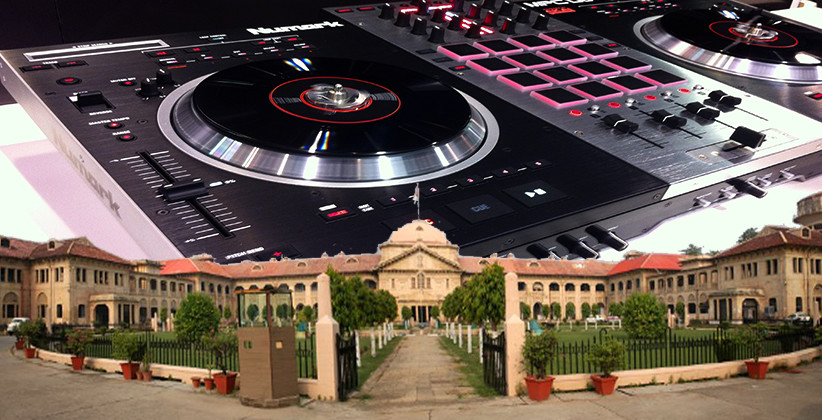The Allahabad High Court on August 20, 2019, in the case of Sushil Chandra Srivastava and Another v. State of UP and Others has imposed absolute prohibition on use of DJs in the state and directed the state government to issue a toll-free number, dedicated to registering complaints against illegal use of loudspeakers.
"noise generated by DJ is unpleasant and obnoxious level. Even if they are operated at the minimum level of the sound it is beyond permissible limits, the Division Bench comprising of Justice Pradeep Kumar Singh Baghel and Justice Pankaj Bhatia said, while hearing a public interest litigation filed by Advocate Sushil Chandra Srivastava.
Aggrieved by the indiscriminate use of Loudspeaker in his neighborhood in Prayagraj, the petitioner had filed the petition against use of loudspeakers in residential areas, regardless of time. This, he said, was a gross violation of Rule 5 of the Noise Pollution (Regulation and Control) Rules, 2000.
The said Rules were framed by the Central Government in exercise of its powers under Section 3(2)(ii), Section 6(2)(b)(1) and Section 25 of the Environment (Protection) Act, 1986, to control noise generating sources.
Thereafter, many judicial pronouncements tried to curb noise pollution and enforce these laws. Provisions and policies relating to permission for use of amplifiers, declaration of silence zones, maximum permissible limit of sound, etc. were made by the central government and the Apex Court, but in vain.
It was also stated that in spite of the law laid down in the case of Noise Pollution (V), In Re, 2005 (5) SCC 733 and the statutory rules framed by the Central Government, on account of the inaction on the part of the concerned authority most of the citizens are feeling inconvenience and their health is affected by the noise pollution.
After hearing both the parties, the Bench observed that "The State Government and its functionaries have miserably failed to perform their duties cast upon them under the Rules, 2000. They have equally failed to enforce the direction of the Supreme Court issued from time to time.
In view of the apex court's verdict in Delhi Air tech Services (P) Ltd v. State of UP, (2011) 9 SCC 354, the court undertook the duty to enforce the law laid down by the Supreme Court and various directions issued from time to time.
Moreover, holding the view that the law relating to noise pollution need to be strictly complied with in larger public interest. The Bench issued the following directions:
- The District Magistrate shall give adequate publicity in leading newspapers regarding this direction and Rules, 2000. He shall notify the name of the authority under the Rules, 2000 and his contact number.
- A toll free number shall be provided to the citizens to make the complaints. If any sound producing instrument is used beyond the permissible limit of sound, a person can make a complaint. The Police will immediately visit the spot and shall measure the noise level by the equipment (Noise meter application) supplied to it. If it is found that there is violation of Rules, 2000 it will stop the nuisance forthwith and shall inform the appropriate authority regarding complaint and action taken by it. The authority shall take action against offender in terms of Rule 7 of Rules, 2000.
- Under the Rules, 2000, no permission for DJ shall be granted by the authority for the reason that noise generated by DJ is unpleasant and obnoxious level. Even if they are operated at the minimum level of the sound it is beyond permissible limits under the Schedule of the Rules, 2000.
- The team constituted by the District Magistrate shall make regular visit of their area particularly before commencement of any festival and apprise the organizers regarding compliance of the Rules, 2000 and the directions of Supreme Court and this Court.
- All places of the worship of all religion shall be bound by the provisions of the Rules, 2000 and directions issued by the Supreme Court and this Court. Any breach of the Rules, 2000 shall be treated to be violation of fundamental right of a citizen.
- The District Magistrate/Senior Superintendent of Police shall convene a meeting before commencement of festivals with organizers and representatives of civil society, to impress upon them to observe the law strictly and in the event of failure the legal consequences that may follow.
- Whoever fails to comply with or contravenes any of the provisions of Noise Pollution Rules shall be liable for a penalty in terms of section 15 of the Environment (Protection) Act, 1986. Non- compliance of the rules attracts the imprisonment for a term which may extend to five years and fine which may extend to Rs.1,00,000/-.
- The State Government is directed to categorize the areas in all the cities of State into industrial, commercial, residential or silence areas/zones for the purpose of implementation of the noise standard in terms of Rule 3 (2) of Rules, 2000.
- The competent authority under the Rules, 2000 and the SHO/Inspector of concerned Police Station are charged personally with the duty of ensuring compliance of the order of the Supreme Court, extracted above, the Rules, 2000 and this order, failing which they shall be answerable to this Court in contempt jurisdiction.









